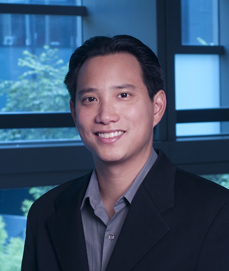Brian Chow Joins Bioengineering Faculty
 Brian Chow, assistant professor in the Department of Bioengineering, is an expert in optogenetics, a field in neuroscience that combines the power of optical control with the precision of genetic techniques to manipulate biological systems. This broad area is significant due to its potential in neurobiology, as well as understanding other complex biological systems.
Brian Chow, assistant professor in the Department of Bioengineering, is an expert in optogenetics, a field in neuroscience that combines the power of optical control with the precision of genetic techniques to manipulate biological systems. This broad area is significant due to its potential in neurobiology, as well as understanding other complex biological systems.
“There is tremendous potential in the ability to alter cellular physiology with the biochemical specificity of a drug, but with the temporal precision of a device, in a genetically targeted cell population,” says Chow. “This unprecedented level of control in manipulating biological circuits opens up many avenues as a research tool or even novel therapeutic interventions.”
Education
Chow earned his B.S. in Chemistry from Stanford University in 2001, and his Ph.D. from M.I.T. in 2008. For his dissertation, Chow developed nanofabrication technologies to build devices directed toward biomedicine and synthetic biology. Chow’s Ph.D. work with Joseph M. Jacobson in the M.I.T. Media Lab was an evolution of his work in nanotechnology as an undergraduate at Stanford. He developed new DNA synthesis techniques via semiconductor photoelectrochemistry, and high-resolution surface modification techniques for next-generation sequencing platforms.
For his postdoctoral work, Chow moved into neuroscience by joining Edward Boyden’s lab at M.I.T., where he pursued a long-standing passion of using broad engineering and genomic technologies for problems in neurobiology. Through his postdoctoral research, he sought to engineer a protein that would silence neurons in a network when exposed to light.
Using a clever genomic screening approach across plants, fungi and bacteria, Chow identified the most promising natural light-activated proton pumps to hyperpolarize cells. In the neuroscience community, finding the ideal proton pump was considered an impossible task, as nearly everyone thought activating the pump on the neuron would cause pH imbalances within the cell that would not be survivable. But Chow’s work, later published in Nature, proved there are natural variants that are safe for the neuron, can switch neurons completely off (unlike in previous tools), and offer fast switching times in the millisecond time scale.
Boyden says, “Brian demonstrated enormous creativity, a great sense of adventure and an uncommon courage to tackle big problems.” Beth Winkelstein , professor in Bioengineering, notes that Chow brings not only a passion for his research and teaching, but a keen desire to move optogenetics into applications where one can better understand disease.
Industry experience
For the past two years, Chow has been working in industry as a venture associate at Third Rock Ventures where he contributed to the formation of two life sciences companies. He went on to join the founding management team of one of those companies, Sage Therapeutics, a biotech company that is creating allosteric modulators of NMDA and GABA receptors to treat psychiatric and neurological diseases of high unmet need, such as schizophrenia and autism spectrum disorders. Earlier in his career, Chow worked for IBM Storage Systems as a wafer test engineer.
Steven Paul, director of the Helen and Robert Appel Alzheimer’s Disease Research Institute
at Weill Cornell Medical College of Cornell University, and formerly executive vice president and president of Lilly Research Laboratories of Eli Lilly, said of Chow, “He is not only an extremely talented and creative neuroscientist, he also is a very knowledgeable neuropharmacologist and drug hunter, as I learned first-hand in working with him closely the past two years as we started Sage Therapeutics. Brian’s broad knowledge of chemistry and electrophysiology proved absolutely invaluable in getting Sage off the ground, and we were all disappointed he elected to return to academia. Our loss however is Penn’s gain.”
DARPA grant
Recently, Chow was awarded a grant from the Department of Defense’s Defense Advanced Research Projects Agency (DARPA), funded through its Living Foundries program. The grant marries Chow’s two research interests of optogenetics and synthetic biology, the latter of which examines the fabrication of complicated biological circuits in engineered cells. Combining the approach with optogenetics enables fine-tunable external control of these circuits.
In addition to the basic science understanding of biological circuits, possible applications for this work include the ability to manipulate or engineer cells to use them, for example, as nano-factories for on-demand production of biological and chemical matter, such as therapeutic biologics. “We hope to develop the tools and principles to do fast closed-loop control of complex synthetic biological systems,” says Chow of the project.
Having multiple perspectives gained from his time in academic research, the high-tech sector, venture capital and drug discovery, Chow hopes to share the best of those broad experiences with those in his lab here at Penn. “My goal is to create a lasting culture of creativity that fosters great innovators in biomedical science. If you provide passionate and talented people the freedom, mentorship and tools to succeed, they will undoubtedly make breakthrough discoveries that will improve the human condition.”
